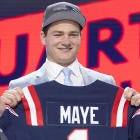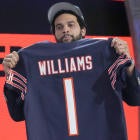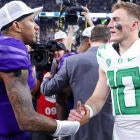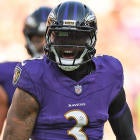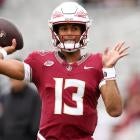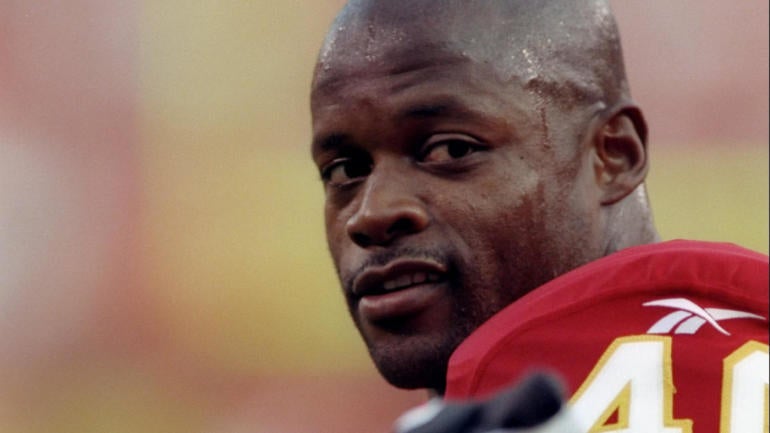
James Hasty has a vision for the future of the NFL. He can picture a league in which a true meritocracy exists, and the men coaching teams and overseeing rosters more closely resemble the men playing the game every Sunday.
Hasty, a former NFL standout defensive back, can see a path forward where NFL hiring cycles produce more diverse and representative results – where one's body of work and character traits can be quantified by an algorithm designed to get the very best candidate to the job he or she is most uniquely qualified for. It's a future where nepotism and cronyism – often the rule in these endeavors – make way for a fair process to anoint the best and brightest, and a light is shined on all who are worthy through new age data and analytics.
Hasty has devoted the last few years of his life to this passion project, founding Eneje Consulting (Enejeconsult.com) in an effort to improve the way hires are made throughout all of college and pro sports. He has worked closely with Dr. Steven Cureton, a sociology professor, to develop a template to measure the characteristics required of great coaches and leaders, and enlisted mathematical experts as well to produce a massive database and a formula to quantify a coach's strengths and weaknesses in order to produce a grade to rank them; potentially both overall and in their particular appeal to any given coach or general manager opening.
Eneje's research and model, perhaps, has the potential to revolutionize this so-often inefficient process – which produces many of the same quick failures and doomed hires over and over again. In a sport in many ways defined by parity, yet with so many of the same owners unable to identify people worthy of the jobs they repeatedly have to fill, it's clear many of these billionaires need all the help they can get to be saved from themselves.
Eneje has produced reports for the league and the Fritz Pollard Alliance, and met with league officials at NFL meetings, but at this point remains on the outside looking in as men begin to be interviewed for this 2022 hiring cycle. Their work has generated plenty of chatter, and Hasty's belief in his project is singular and unrelenting, as he continues to network with coaches and agents and team decision makers to try to impact this inexact science for the better.
"It was just something I felt motivated to get involved in," Hasty told me. "Like so many people, I got tired of seeing guys not getting opportunities who were worthy. I was able to be coached by Willie Shaw my last year in the league with Kansas City, and he was an incredible source of knowledge. I learned so much from him at the end of my career, and Willie never got a head coaching opportunity.
"And everyone who knew Willie Shaw knew he was as a great football mind and a great leader and he had everything you could look for in a head coach. Those were the kind of things that I would think back on, and through the pandemic we're all sitting around and frustrated in the aftermath of George Floyd's killing and I wanted to see if there is a way to come up with a system that would be fair to everyone – not just to minority candidates but to all who are deserving – and this is the result of that."
Hasty is his own salesman, and a highly effective one at that, and his work to this point – both quantifiable metrics and in terms of trying to define and harness how to best evaluate coaches – is quite intriguing. Dr. Cureton's 40-page report, entitled "Minority Outsiders: An Examination of the NFL's Diversity, Equity, and Inclusion Habits in Hiring Head Coaches," should be mandatory reading for every owner, team president and top official at the league office.
Laying the foundation
Hasty, 56, was drafted by the Jets in the third round in 1988 and was a standout cornerback until he retired in 2001, twice going to the Pro Bowl, earning one All Pro nod and leading the NFL in interceptions in 1999. His aggressive bump-and-run technique became ubiquitous and he and teammate Dale Carter were arguably the best tandem in the NFL at the height of their prowess in Kansas City. Hasty also was an assistant head coach at Bellevue High School when the team won four straight Washington state titles, and has been a student of the game his entire life.
He found an early champion in Eneje's efforts in NFL diversity pioneer John Wooten, the longtime former head of the Fritz Pollard Alliance, and Wooten has campaigned among his peers to try to get Hasty a more formal audience with owners and Commissioner Roger Goodell. Wooten believes Eneje's metrics – a proprietary Coaching Performance Assessment System (CPAS) that comes up with a cumulative ranking of all 2,300 college and pro coaches currently in the firm's system – could be transformational in making NFL hiring more egalitarian.
"This can be something that can open up doors that we've never had opened before," said Wooten, a former NFL player and longtime executive who became chairman of the Fritz Pollard Alliance in 2003 until retiring a few years ago. "Because they are talking about something that gives you the real foundation of trying to evaluate a coach.
"So often we've heard, 'Well, he doesn't have this or hasn't put a staff together, or he doesn't quite understand this or that or he doesn't call the plays.' We've been hit with all of these kinds of things, but it's not about all of that. It's about the ability to run your ball club, and this program that Hasty and Dr. Cureton have put together could help make this a better and more open process of hiring."
Hasty explains the CPAS in terms many football fans could understand:
"We developed a formula we can apply to everyone and remove everyone's biases," Hasty said. "Like the way we believe in QBR or other metrics and formulas that have been created and we all accept it, well that's what wanted to be judged on. That is what we have created for the evaluation of coaches. We have created a formula to ultimately identify who the best candidates are, and we can go back to the '20s and '30s on coaches from that time, right up to the present and apply a score to them."
How it all works
Hasty and his team are adding coaches at all levels to the database and will be able to continue to track and assess them as they go up the ranks. They factor in known beliefs and attitudinal characteristics of the individuals as well and personality traits. "We marry the human element and the numerical aspects of what a coach has accomplished and combine the two and give you one score or grade," he said.
For every season, Eneje combines various factors that best encapsulate all relevant coaching performances on a team and compute a final score (from 0 to 100) for every coach. A passing grade of 70 roughly corresponds to a winning season, 80 to a playoff appearance, and 90+ to playoff success. For the 2022 hiring cycle, Hasty's model identified the following men as the most qualified NFL head coaching candidates based on their overall scores:
Eric Bieniemy | Chiefs offensive coordinator |
Todd Bowles | Buccaneers defensive coordinator |
Joe Barry | Packers defensive coordinator |
Brian Daboll | Bills offensive coordinator |
Dave Toub | Chiefs special teams coordinator |
Teryl Austin | Steelers senior defensive assistant |
Leslie Frazier | Bills defensive coordinator |
Harold Goodwin | Buccaneers assistant head coach |
Josh McDaniels | Patriots offensive coordinator |
Joe Woods | Browns defensive coordinator |
Matt Eberflus | Colts defensive coordinator |
The list is split almost equally in terms of minority candidates, and this evaluation does not include men like former NFL head coaches Jim Caldwell and Doug Pederson, who are currently out of the league but are already candidates in Jacksonville.
"Those were clear and obvious candidates," Hasty said, "and I challenge anyone to read their bios and do their research on them. All of those guys are winners and they are great minds."
Moving forward
To this point, Hasty's gospel is being spread via word of mouth, with the NFL and Fritz Pollard Alliance not opting to officially endorse it just yet as the project is still relatively new and, as with anything new and innovative, it takes some time to curry acceptance. Rod Graves, the head of the Fritz Pollard Alliance, said: "We are aware of the efforts of Eneje and are fully interested in what the company claims in terms of predictive analysis, and we are closely following their progress."
Troy Vincent, the NFL's head of football operations and point person for the league's efforts to diversify its head coach, GM and team president ranks, is also very well aware of what the company is doing: "We have no plans on implementing James and John's ideas into our current plans. We are very comfortable with our data and statistical models we use to aggregate possible candidates that should receive high consideration."
Eneje continues to curate reports and briefs – Dr. Cureton recently sent another document to the FPA – and make inroads through Hasty's connections in the game.
I can't help but wonder if his work gets more attention – and direct involvement in at least some of these hiring processes – over time, as he aims to speak to owners, find out the specific characteristics they most seek in a coach, and then produce recommendations of the specific coach and GMs they believe would work both together.
"In a perfect world we'd work with the NFL on the process and identifying candidates and coming up to a final score and it's all based on numerical conclusions," Hasty said. "It's not based on our opinion. Our database scores down to tenth of a percent and if two guys are very close we can always dig deeper and look at strength of schedule or another variable; there will never be a tie. This isn't about identifying the best black candidates. It's about identifying the best candidates and giving everyone an equal opportunity."














